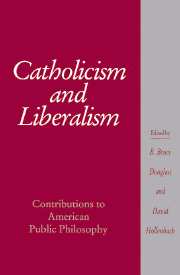Afterword: a community of freedom
Published online by Cambridge University Press: 19 February 2010
Summary
The Catholic church crossed a watershed in its relationship to modern democratic government in the late 1950s and early 1960s. During this period, the transnational church fully committed itself to the constitutional democracy and human rights that had long been taken for granted in American Catholicism. The subsequent public activity of the church in regions such as Eastern Europe, Latin America, Southern Africa, Korea, and the Philippines suggests that this commitment is being pursued even at great cost and can be expected to be irrevocable. The Second Vatican Council marked the cessation of the battle of attrition fought between Catholics and liberals in the nineteenth and first half of the twentieth centuries.
On one reading of this recent history, the terms for the end of hostilities were Catholic surrender and liberal victory. The essays in this volume, however, tell a considerably more complex tale. The church has not simply taken over liberal ideas uncritically, but is putting its own interpretation on them and has begun to develop its own distinctive understanding of the meaning and purpose of democracy. Most importantly, the Catholic rapprochement with democratic freedoms has been accompanied by repeated insistence on the importance of commitment to the common good for the wellbeing of the societies in question. The documents of Vatican II and the writings of popes from John XXIII to John Paul II are filled with affirmations that communal solidarity is a prerequisite for a social existence worthy of human beings.
What makes this pertinent to the United States today is that our own experience of community is increasingly wanting.
- Type
- Chapter
- Information
- Catholicism and LiberalismContributions to American Public Policy, pp. 323 - 343Publisher: Cambridge University PressPrint publication year: 1994
- 1
- Cited by



